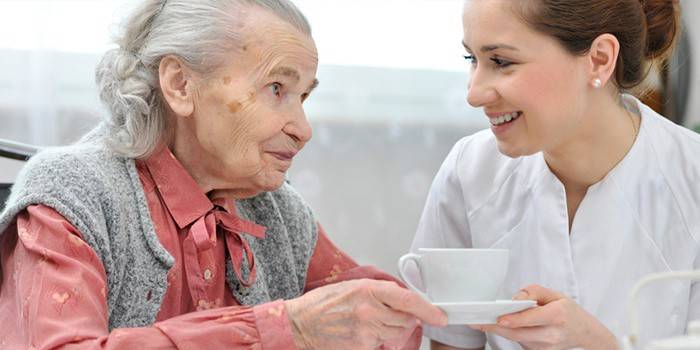Guardianship concept
Guardianship is the process of a guardian acting to care for an incapacitated person who has a physical disability (disability) and is unable to independently perform certain actions.
Incapacitated citizens include:
- adults who have been declared incompetent by a judicial authority;
- persons with confirmed disabilities;
- children under fourteen years of age.
Who can be the guardian of an incapacitated person?
The following categories of people can apply for guardianship:
- an adult (who has reached the age of majority);
- no criminal record;
- without alcohol addiction;
- capable;
- having positive personality traits;
- citizens who own housing (rent residential premises).
- having a normal relationship with the ward;
- satisfactory state of health.
Close relatives of incapacitated persons often express their desire. In certain cases, it is allowed to appoint a person who has temporary, partial legal capacity as a guardian. For example, a person who has reached the age of sixteen can be a guardian if they obtain permission from their legal representative.
Additional Information
Guardianship of a mentally ill person comes with great responsibility. Unfortunately, government support measures currently cannot be called satisfactory. The same cannot be said about the strict supervision of guardians.
- A person officially performing guardianship functions does not have the right to inherit the property of the ward. After his death, the property will go to his legal heirs or the state.
- Transactions with the property of an incapacitated person may be challenged in court at the request of other interested parties.
Dear readers!
We describe typical ways to resolve legal issues, but each case is unique and requires individual legal assistance.
To quickly resolve your problem, we recommend contacting qualified lawyers on our website.
What are the possible reasons for suspending or terminating guardianship?
Guardianship of minors will end the moment they reach the age of majority (cessation of childhood). It may also end if, after a court decision, the minor has received the right to marry. A child acquires full legal capacity when he begins to carry out entrepreneurial activities.
In order to obtain full legal capacity in such a situation, a person needs to contact the PLO; if the government body refuses, the person has the opportunity to resolve this issue in court. When a person reaches fourteen years of age, guardianship is established over them. Guardianship may end over a child if his natural parents have reached the age of majority.
Another reason why guardianship may be terminated would be the adoption of a child. The guardian will no longer be required to fulfill his obligations. The guardian himself may decide to cease performing guardianship duties. In this case, he needs to prepare an application and submit it to the specialist handling the case at the government agency.
Guardianship does not refuse such treatment and relieves the person of the duties of a guardian. This decision is aimed at not creating conflict, contradictory situations between the parties to the relationship. Guardianship terminates upon the death of one of the parties or transfer to a boarding school.
On what grounds is a person declared incompetent? First of all, it should be understood that the official recognition of a person as incompetent is an opportunity to protect him from harm to himself and others. Only a court can declare a person incompetent. To do this, two very important aspects must be taken into account.
- Medical (implies a psychiatric examination, which indicates the depth, nature and danger of the disorder). This procedure can be performed either at home or in a hospital. If a person refuses, the examination procedure is carried out forcibly.
- Legal (consists in the person’s confirmation of his lack of understanding of the actions he is committing). In this aspect, the court relies on the testimony of relatives, the board of trustees, as well as representatives of medical institutions).
In order to start a case for declaring a person incompetent, it is enough to draw up a paper that must be submitted at the place of residence (if the citizen is undergoing treatment in a medical institution, then the application is written at the actual place of treatment).
What are the possible reasons for suspending or terminating guardianship? This is provided for by the Civil Code, Art. 39-40 and includes the following points:
- death of the person under guardianship or trustee;
- the document indicating the period for appointing a guardian has expired;
- if the trustee himself abandons the ward;
- conflict of interest;
- if the guardian does not fulfill his obligations;
- recognition of the ward as legally competent.
Registration of guardianship is a complex process both from a moral point of view and from a legislative point of view. This issue should be approached rationally. In any case, guardianship makes it possible to maintain a decent life for the person under guardianship, no matter what age he is
Payments for guardianship and conditions for termination of guardianship
Federal Law No. 48 art. 29, 30
Civil Code st. 39, 40
Guardianship is terminated in the following cases:
- death of a ward or guardian;
- the act on the appointment of a specific guardian has expired;
- the guardian is released at his own request or due to a conflict of interests of the parties;
- the guardian is removed for dishonest performance of duties or uncovering facts of violation of the law and ignoring the interests of the trustee;
- cancellation of incapacity by the court and recognition of the full adequacy of the citizen.
Obviously, it would be correct to talk about terminating guardianship over an incapacitated person only in the event of his death or a change in the status of legal capacity in court at the request of a guardian or guardianship council.
In all other cases, guardianship cannot be terminated, but only a change of person authorized to protect the rights and interests of a citizen who has found himself incapacitated due to mental illness and in need of constant help and care.
Dear readers, the information in the article may be out of date, please take advantage of a free consultation by calling: Moscow, St. Petersburg or using the feedback form below.
The benefit amount for 2021 is 1200 rubles.
To receive payments, a caregiver must submit an application and documents confirming guardianship to the local social security office. The length of service that goes during the performance of the functions of a guardian of a ward over 80 years of age is counted in the insurance period and goes into retirement.
The law implies that the guardian of an incapacitated citizen must perform his functions free of charge, without receiving any payments.
But in extreme cases, social security authorities may assign additional compensation:
- If the caregiver cannot work because he is caring for the ward around the clock.
- Care is provided for a group I disabled person.
- If care for an elderly ward must be permanent, as determined by a doctor.
A person caring for an elderly relative can count on payments of no more than 1,200 rubles.
The benefit can be received every month; it is believed that in addition to cash payments, the guardian can receive an inheritance from the ward. But this is only possible in a few cases:
- if the guardian and the incapacitated person are related, the guardian inherits from the ward;
- if the ward is over 80 years old (and is not declared incompetent by a court decision) writes a will in favor of the guardian.
There are no other payments for guardianship.
The state trustee body may remove the duties of a guardian:
- If the guardian uses guardianship for personal gain.
- It has been established that the guardian fails to cope with his responsibilities and causes harm to the ward.
- At the request of the guardian himself: due to a change of place of residence, deterioration of health, due to family circumstances.
Guardianship ends automatically:
- upon the death of a guardian;
- upon the death of the ward.
The legislative framework
| Articles | Description |
| 145 | Algorithm of actions of guardianship authorities when registering guardianship. |
| 146 | Basic requirements for candidates. |
| 148 | Rights of wards. |
| 148.1 | Rights and obligations of persons appointed as guardians. |
Guardianship can also be revoked legally. You can read about a similar phenomenon in verses 39 and 40. Civil Code of the Russian Federation.
Guardianship of an incompetent elderly person and a child is established based on the norms of the Civil and Family Code of the Russian Federation and legislative acts adopted by the Government.
Article 145 of the RF IC describes the procedure for appointing a guardian. Article 146 of the RF IC contains the requirements that applicants for guardianship must meet. Article 148 contains a list of rights of wards. Articles 39, 40 of the Civil Code of the Russian Federation contain a list of reasons for stopping patronage.
- The main document from which all concepts (Article 2), rights and obligations and other issues arise is Federal Law No. 48 “On Guardianship and Trusteeship”, as amended on December 31, 2017.
- The Civil Code defines all the requirements that apply to guardians.
- The Family Code regulates the specifics of guardianship registration.
- The list of diseases that do not allow the registration of guardianship is presented in Decree of the Government of the Russian Federation No. 117 of February 14, 2013.
Does the future guardian need a medical certificate?
A medical report on the health status of a potential guardian is included in the list of mandatory documents submitted to the OiP body (PP No. 117 2013/14/02). A medical verdict is necessary to exclude dangerous diseases that are incompatible with guardianship:
- tuberculosis;
- active infectious diseases in the absence of remission;
- cancer;
- mental and behavioral disorders, neuroses;
- alcohol, drug addiction, substance abuse;
- Disability group 1 – regardless of the cause.
A medical examination can be completed at any public or private institution that has a medical license.
A list of medical specialists and tests is contained in
Order of the Ministry of Health No. 290n 2014/18/06
Appendix 1, clause 5, it is exhaustive and is not subject to addition and/or change.
What are the consequences of declaring a person incompetent?

The sample application must be drawn up in accordance with the norms of the Code of Civil Procedure of the Russian Federation and it must contain the following information:
- the authority to which the application is submitted;
- personal data of the applicant;
- document's name;
- information about the person who needs to be declared incompetent;
- justification of your requirements;
- link to the evidence base;
- put forward requirements;
- list of documents;
- date of compilation and signature.
What are the consequences of declaring a person incompetent? These factors come into force only after a court decision. Namely:
- prohibited from marriage;
- divorce in this case occurs according to a faster scheme and unilaterally;
- an incapacitated citizen does not have the right to enter into any transactions or sign contracts;
- does not have the opportunity to take part in elections;
- an incapacitated person cannot independently dispose of property.
Grounds for declaring a citizen incompetent
Civil Code art. 29—32
Civil Procedure Code art. 281—286
Federal Law No. 48 2008/24/04 edition 2015/24/04
Only a court can recognize and declare a person incompetent.
To recognize a fact, two aspects must be present:
- medical;
- legal.
The purpose of official recognition of incapacity is to protect a citizen from harm to himself and other people associated with the objective inability to control his actions.
The medical aspect is established by a forensic psychiatric examination appointed during the consideration of the case (Civil Procedure Code Art. 283), which determines the depth of the disorder and the degree of potential danger to a person’s independent activity. Targeted forensic examination can be carried out on an inpatient or outpatient basis. A person’s demonstrative refusal to undergo an examination is grounds for a forced examination.
The legal aspect lies in confirming the citizen’s misunderstanding of the essence, purpose and consequences of his actions. In this case, the court relies on the presumption of the person’s legal capacity. Facts to prove his incapacity must be presented by the initiator of the process (family members and relatives, board of trustees, representatives of the medical institution).
Confirmation of a person's incapacity and a court decision recognizing this fact are grounds for establishing guardianship. Consequences of recognition of incapacity:
- marriage is excluded (SK Art. 14);
- divorce is carried out according to a simplified scheme, for example unilaterally (SK Art. 19);
- impossibility of concluding transactions (Civil Code Art. 171);
- participation in elections is excluded (Federal Law No. 67 2002/12/06 edition 2016/28/12 art. 4 clause 3);
- impossibility of sole disposal of property (Civil Code Art. 37).
You should know that the declaration of personal incapacity by court order is reversible.
If events develop positively, the verdict “incapacity” can be replaced with the wording “limited legal capacity” or canceled altogether (Civil Code Art. 29, paragraph 3).
Registration procedure
How to obtain guardianship over an incapacitated person?
The applicant should do the following in this order:
- Preparing a package of papers.
- Visiting government agencies.
- Submitting an application plus supporting documents.
- Consideration of the appeal.
- Setting the solution and directing the response.
We invite you to read: Response to the requirement for discrepancies between VAT revenue and current account
In order to formalize guardianship over an incapacitated relative, you need to prepare the following documents:
- completed application;
- document confirming permanent income (certificate from place of employment);
- salary certificate for the previous year;
- documentary evidence of ownership of residential space (apartment rental agreement, purchase and sale agreement);
- medical confirmation of legal capacity;
- a document assessing the personal qualities of the applicant from the place of employment;
- autobiography.
A certificate about the condition of the person who requires guardianship is provided by the medical institution performing the supervision.
Guardianship may be denied to applicants who have the following characteristics:
- alcoholism;
- lack of stable income;
- problems with law;
- lack of housing.

If a person does not own real estate, but is able to rent residential premises and pay money under this agreement, this will not be a basis for refusal.
Basic Concepts
Before you take out guardianship for a disabled person, you need to understand what this means.
This concept characterizes the form of caring for a person with a special status and protecting his interests. Most often, this term is applied to children under 14 years of age and the elderly. There is also a category of people declared incompetent by a court decision. Guardianship can take various forms. If full guardianship is established over minor children, and this is not even discussed, then in relation to those who have long reached the age of majority, both full guardianship and patronage can be applied.
- In the first case, mandatory recognition of incapacity in court is required. Registration of this form of guardianship over an incapacitated relative is advisable if we are talking about mental disorders. They manifest themselves in the fact that the incapacitated person is in an inadequate state and, for certain reasons, does not have the ability to normally perceive what is happening to him and around him. Anyone who wants to obtain guardianship must understand what he has to do and what responsibility will fall on his shoulders, always think about the consequences.
- Patronage is a slightly different form. In this case, much fewer rights and responsibilities are provided. Registration of guardianship over a disabled person of group 2 in the form of patronage is possible if he is in a psychologically healthy state. Only physical care is required from the caregiver. The ward is directly involved in all necessary commercial transactions; he can only be assisted. He also retains the right to dispose of his property and funds allocated by the state.
More information about how guardianship and trusteeship of minor children is formalized?
What is the procedure for obtaining guardianship?
As long as a citizen is legally competent, he can independently carry out legally significant actions, understand the essence of what is happening, and take care of himself and his property. However, due to a mental disorder, the court may declare a person completely incompetent. This fact must be confirmed by a medical report, acts of the guardianship authorities, and other evidence.
The law also allows for temporary restrictions on legal capacity, after which a guardianship regime can be introduced. Under guardianship, a citizen can himself carry out legally significant actions, but most transactions require the consent of the trustee. You do not need to obtain permission for small household transactions.
The procedure for introducing guardianship over an incapacitated citizen consists of the following stages:
- conducting a medical examination to determine a mental disorder;
- filing an application with the court demanding recognition of incapacity (relatives, guardianship authorities, and other authorized departments can file a claim);
- issuance of a judicial act;
- submitting an application for establishment of guardianship to the guardianship department and other necessary documents;
- making a decision to appoint a guardian.
The decision to introduce guardianship will be made by the head of the local administration based on the conclusion of the guardianship department. The order will indicate the period for which guardianship is introduced, the procedure for disposing of the property and financial assets of the ward, and other conditions. If the court subsequently finds that the citizen’s legal capacity has been fully restored, the guardianship regime will be cancelled.
What is the procedure for obtaining guardianship? This is a rather lengthy procedure that takes time. Registration of guardianship occurs after a decision is made by the court and in several stages:
- The court's recognition of a person's incapacity is sent to the guardianship authority (at the person's place of residence) within three days after the verdict is issued.
- Guardianship is granted for three months. If a guardian is not found within this period, then this function is entrusted to the guardianship and executive body.
- If there is a guardian, he submits an application to the guardianship authorities.
- Next, seven days are given to process the application; the guardianship authorities may also request additional papers, which must be provided very quickly. Inspection of housing and conditions also takes place at this stage. An additional three days are allocated for completing the entire survey report.
- Then the guardianship authority analyzes and analyzes all collected data within 15 days.
When a decision is made, the applicant is notified within three days by a special act.
To establish the fact of a person’s incapacity, it is necessary to prove his inability to use civil rights, manifested by:
- in not understanding the meaning of what is happening around;
- inability to understand one’s actions and give an account of them;
- loss of ability to direct actions.
Attention: at the state level, guardianship issues are dealt with by the guardianship and trusteeship authorities (TCB).
Adult citizens are deprived of legal capacity only by a court decision. But first, a full examination in a psychiatric clinic is necessary. It is carried out:
- Voluntarily, when the patient consents to manipulation.
- Forcibly, in case of a threat to the life and health of other persons.
Attention: the examination is carried out by specialists using modern developments recognized internationally.
After receiving the doctor's opinion, the next step is to apply to the judicial authorities. It is regulated by Art. 281 of the Civil Procedure Code (CCP). An application for recognition of incapacity can be submitted by:
- relatives living:
- together with the patient;
- separately;
- OPP at the place of registration;
- the medical institution where the citizen is observed;
- the hospital (boarding school) in which he is kept.
Appointment of a guardian
After the judicial authority makes a decision on a person’s incapacity, it is sent to the OPP at the place of his registration. Guided by Art. 35 clause 1 of the Civil Code, art. 11 clause 2 of the Law “On Guardianship”, specialists of this government agency are obliged to make a decision within a month on the appointment of a guardian or the placement of the patient in a specialized institution.
Important: a citizen recognized as a guardian receives the right to act in the legal field on behalf of the incapacitated person. At the same time, his responsibilities include respecting the rights of the ward.

A person whose responsibilities include guardianship of an incapacitated person must, in some cases, seek permission to act from the OPP. Without one, he is prohibited from:
- manages the property of the ward;
- enter into transactions on his behalf;
- sell or otherwise dispose of real estate and other valuables;
- pledge them;
- allocate shares;
- accept as a gift or acquire for your own benefit;
- participate in transactions with relatives regarding the property of the ward.
Rights
Legislative norms determine that a guardian has the following rights:
- receive state benefits and benefits;
- draw up an appeal to government agencies;
- apply for payments in the event of damage to an incapacitated person;
- stand up to protect the property of the ward by legal means (certify the signature of the ward);
- contact the hospital on behalf of the ward to receive free help.
The state gives the guardian four extra days off every month. If a person does not use these days, he can use the weekend in another month. Due to the state of health of the ward, his guardian may take additional leave from work for a period of two weeks. Paid leave will not be given and wages will not be paid. The guardian also has the right to refuse long business trips to other localities.
The list of responsibilities of a guardian of an incapacitated citizen is as follows:
- Buy products, things and make other transactions to meet the vital needs of the person under guardianship.
- Monitor the hygiene, nutrition and health status of the incapacitated person.
- Uphold the rights of the ward and protect his interests in any controversial situations.
- Carry out responsibilities on behalf of the person under care, for example, paying bills.
- Properly manage payments received from the state (pension, benefits). They can be spent exclusively on the needs of the ward.
- Apply to the court if the legal capacity of the ward citizen is partially or fully restored.
- Protect, defend and try to increase the property of the ward.
When registering guardianship of a child, the list of responsibilities will also include education, conflict prevention and care for all-round development. Until the age of 16, a minor ward is required to live together with his guardian in the same apartment. Children from 16 to 18 years old rent separate housing, in accordance with Art. 36. Civil Code, may upon receipt of the consent of the PLO.
The government has legally established the following rights of guardians:
- Apply to the authorized bodies (court, prosecutor's office, pension fund) for the collection of alimony, provision of benefits, allocation of allowances and other payments.
- Protect the rights of the ward by communicating on his behalf with the court or law enforcement agencies.
- Demand compensation for damage caused to the health of the ward when such an incident is detected.
- Take acceptable measures to protect the movable and immovable property of an incapacitated citizen.
- Contact medical, educational and other institutions to receive certain services. Their cost will depend on the pricing policy of the establishment.
A person caring for an incapacitated citizen does not have the right to freely dispose of his property. Any transactions for the sale, exchange or division of property are discussed with the guardianship authorities. They can agree to such a transaction only in the interests of the ward. Selfish actions are stopped immediately.
The guardian has the right to give gifts to the ward. When transferring property (apartment, car), a gift deed is drawn up and notarized.
We suggest you read: Can a criminal case be initiated for loan debt?
The person appointed by the PLO may incur administrative, criminal or property liability for abuse of rights or inaction. If there was intentional damage to the ward's property, the guardian will be forced to pay compensation. If an official representative fails to act, due to which an incapacitated citizen is injured, administrative or criminal liability is possible.
The rights and obligations of the trustee are provided for by the Civil Code, Art. 37-38.
The guardian has the following legal rights:
- Be the first to appear in the case of your ward, protecting his rights wherever necessary (the guardian always acts in the interests of his ward).
- The guardian can completely control the actions of his protégé.
- The trustee may file lawsuits on behalf of the ward.
- The guardian can live in the apartment of the ward.
- The guardian also has the right to independently (without the ward) visit medical institutions and call a doctor to the ward’s home.
- All social payments (they are paid in the amount of 1,200 rubles) and benefits are under the control of the guardian, and he can freely dispose of them (to support his ward). At the same time, he has the right not to notify the guardianship authorities.
- The trustee can also file a petition with the court to recognize his ward as legally competent if the latter has made positive changes.
The trustee also has obligations to the ward and the state:
- He must carry out an inventory of his ward’s property within three days from the date of assigned duties.
- A guardian must act solely in the interests of his ward.
- If the place of residence of the guardian and his ward has changed, then the guardianship and trusteeship authorities should be notified about this.
- The trustee has the right to defend himself and his ward in any instance.
- If the guardianship authorities give their consent, the guardian can enter into monetary agreements on behalf of the ward.
- Paying the ward's taxes is also the responsibility of the trustee.
- Every year, the guardian must submit a report to the guardianship authorities about the spent funds of the ward.
The relationship between a guardian and an incapacitated elderly person is formalized by an agreement. Responsibilities that are specified in it:
- protect the rights of the ward in all instances;
- make transactions on his behalf;
- manage property based on the interests of the ward;
- organize care;
- provide treatment;
- monitor the condition of housing;
- seek advice from medical institutions;
- organize quality food;
- submit a report to the guardianship authorities.
The guardian has the rights:
- make decisions on behalf of an incapacitated person;
- defend his interests in court and government organizations;
- provide care and control of the health of the ward;
- choose medical institutions;
- submit an application for benefits;
- spend funds on the ward at your own discretion;
- include the time of guardianship in the length of service when calculating a pension;
- write an application for a free vacation.
In case of violation of the terms of the contract, the inspection authorities may deprive the right of guardianship to care for an elderly person. The reasons for this action may be:
- incapacity of the guardian himself;
- lack of necessary care;
- use of guardianship for personal gain;
- the patient being unattended;
- misappropriation of funds;
- deterioration of health due to poor care;
- lack of food for the ward;
- failure to provide required medications;
- restoration of the patient's capacity.
You can issue a waiver of guardianship for an elderly ward by writing a statement. This happens in cases such as:
- change in material condition;
- serious illness of the caregiver;
- loss of legal capacity;
- conflict situations with the ward;
- loss of ability to work;
- decision of the guardianship authorities;
- expiration of the contract;
- death of a guardian or ward.
The guardian bears full legal responsibility and is responsible for raising children under fourteen years of age. He is a legal representative appointed by the court or guardianship authorities. The guardian must fulfill the responsibilities of raising the child. Guardianship can also be established over adult incapacitated citizens (for example, disabled people).
A trustee is a person who provides assistance and assistance in the exercise of rights to persons from 14 to 18 years of age or persons who are not fully capable. Emancipated citizens over 16 years of age can prove their full legal capacity; a guardian is not appointed for them.
When a child or citizen in need of care is identified, specialized authorities search for and appoint a caregiver within one month. Until this time, the guardianship and trusteeship authorities are responsible for him.
Legislative regulation
Each guardian has rights and responsibilities over the incapacitated person, which are defined in Art. 36 Civil Code, Article 15 of the law on guardianship. He should not neglect them and act exclusively in the interests of the elderly person, provide him with everything he needs, create a comfortable environment, and maintain a high quality of life.
The legal representative has the right:
- speak in government institutions in defense of the rights of your ward;
- provide care and support to an incapacitated citizen;
- act on behalf of the ward in transactions for the disposal of his property owned;
- choose the place of residence and the region where guardianship is established (accordingly, he must reside in this territory);
- act in the interests of the elderly person, taking into account his opinion.
The duties of a guardian over an incapacitated person include the following aspects:
- provide the ward with the necessary treatment and care in case of serious deviations in health;
- protect the property and housing rights of older people;
- submit a report on the management of property and funds to the guardianship authority on an annual basis;
- if the grounds for a person’s incapacity are no longer relevant, he is obliged to send documents to the court to restore his legal capacity;
- conscientiously provide the social services that the citizen needs.
In case of improper performance of duties by the legal representative (damage to property, harm to health, spending money in his own interests), the guardianship authority records this fact with the help of an act. Then he takes measures to bring him to administrative or criminal liability, depending on the severity of the harm.
According to the law, any citizen who has reached the age of majority can obtain guardianship over a disabled person of group 1, as well as:
- persons considered partially capable, namely those who are 16 years old, but subject to official permission from legal representatives;
- relatives of the incapacitated person;
- state guardianship authorities.
Representatives of these categories of people have the right to submit documents to obtain guardianship over a disabled person.
By the way, find out what documents are required for guardianship of an elderly person?
There is also a separate category of people who do not have the right to obtain guardianship over an incapacitated relative. Its representatives are:
- persons serving sentences in prison;
- convicted;
- insolvent citizens;
- minors;
- deprived of the right to care for minors.
This also includes social services, as well as government bodies that already help citizens with housework.
If you do not belong to this category, and also manage to properly prepare for the process, then registering guardianship over a disabled person of group 1 will be successful.
The procedure for registering guardianship, as well as relations in this area, are clearly regulated. If necessary, an additional agreement is drawn up, according to which the activities of the trustee are limited.
We suggest you read: How to take into account income and expenses from the sale of depreciable property for income tax purposes
Registration of guardianship over a disabled person of group 2 means that upon receipt of documentary permission, the person caring for him must:
- carry out all necessary measures aimed at caring for the ward and protecting him. We are talking about providing proper care, timely treatment if necessary, controlling the incompetent, preventing them from causing harm to themselves and others;
- represent interests in government authorities, participate in negotiations with private individuals;
- constantly monitor the health status of your ward - if improvements are noted, they must be properly registered through an examination, which allows a particular citizen to be restored to full rights;
- manage the affairs of the disabled person, namely pay for utility bills, taxes and other necessary payments.
Documentary registration of guardianship over a disabled person of group 1 gives the right to dispose of income (alimony, benefits, state payments) in accordance with needs. The feasibility of expenses is assessed using annual reports. The same applies to managing the property of someone who needs help. This means everything from leasing real estate to alienation.

Registration of guardianship over an incapacitated relative also implies the responsibility of the party who assumes the responsibilities described above. If damage is caused to the ward or his property, the guardian undertakes to compensate for the damage in full. In accordance with the Criminal Code, punishment is determined when an incompetent person is left in a life-threatening situation without protection.
It is useful to know what are the consequences of limiting the parental rights of the father or mother of a child?
There is a list of persons who will not be able to obtain guardianship over a sick person:
- Registered with a narcologist or psychiatrist.
- Previously receiving guardianship, but subsequently deprived of this right.
- Having a criminal record.
- Minors.
- People deprived of parental rights.
- Suffering from serious illnesses.
- Alcoholics, drug addicts and people suffering from infectious diseases.
There is a list of persons who can receive guardianship over a sick person:
- Close people.
- Relatives.
- Social workers.
- Outsiders who have expressed a desire to become a guardian.
- Persons who do not have medical contraindications for health.
To obtain guardianship over an incapacitated citizen, you will need to collect a lot of documentation. If the person is a relative of the ward, then things will be simpler.
When the documents are collected, you need to make a written statement from both parties that they want to become a ward and a guardian, respectively.
These statements are included with all documentation. In addition, the applicant for guardianship is required to provide certificates from his job stating that he has a regular income and is officially registered with the enterprise.
Unemployed citizens will most likely be denied guardianship. An exception may be pensioners who are completely healthy and can perform the duties of caring for an incapacitated person.
Having received an application for guardianship, social protection authorities will send a specialist to assess the situation:
- A guardianship official will check the living conditions.
- Assess the relationship that exists between the future guardian and the ward.
- It is possible to interview neighbors and list other candidates for guardianship.

Once the review has been completed, the documents are submitted for thorough review and then a decision is made.
Let's celebrate! A negative decision is made much faster than a positive one. This can be received within 5 working days. To approve a candidate, reasons are needed, and if there are not enough reasons in the submitted documents and in the specialist’s report, the process of approving the application may be delayed.
There is no rush to obtain guardianship.
First you need to collect all the necessary certificates that confirm the citizen’s incapacity and documentation that you have the right to guardianship over him:
- Then you visit the guardianship and trusteeship authorities.
- Write a statement.
- Attach the required documentation.
- A government agency specialist checks the received papers and, if the entire package of documents is present, accepts it for consideration.
- Each case is considered individually and a decision is made.
Note! The application review process can take from one week to several months. Guardianship authorities are not limited in time. If the authorities render a positive verdict, then the citizen receives a document stating that he is rightfully the guardian of the incapacitated person.
Remember that if important documents are missing, the application will not be accepted for consideration. To avoid wasting time, prepare in advance.
List of required documentation:
- Passport of both participants in the process.
- Statement from the future guardian.
- Statement from the future ward, if he is partially capable.
- 2-NDFL of the future guardian for 12 months.
- Autobiography and characteristics from the employer.
- A certificate stating that the citizen is law-abiding and has never been involved in internal affairs bodies.
If a person thinks that, having formalized guardianship, he is now the rightful owner of all the property of the ward and has complete control over him, then he is deeply mistaken. The guardianship and trusteeship authorities will regularly check these people.
Moreover, the checks will be sudden, not cursory. Each visit will be documented and a report drawn up. After completing the paperwork, the first inspection will take place in about a month, then after three months, then after six months. Further inspections will be carried out once a year.

In addition, the guardian himself is obliged every year, no later than February 1, to send a detailed report to the authorities and describe in it the condition of the ward himself, the conditions of his life and health, and the state of the property of the incapacitated person.
Each guardian receives a benefit for caring for their ward. This amount is considered individually. This is influenced by the severity of the disease, the person’s age and living conditions. The standard benefit is 1200 rubles monthly.
Let's celebrate! If children are placed under guardianship, government agencies issue a one-time one-time benefit in the amount of 14,500 rubles. If the child is a disabled person of the first group, then additional assistance will be 5,500 rubles monthly.
The right of guardianship over an incapacitated citizen is granted to a son or daughter who has official employment and a stable income. The guardian must own the living space where the ward will be located or live in the house with the mother or father.
Requirements
- Constitution of the Russian Federation
- Civil Code of the Russian Federation
- Family Code of the Russian Federation
- Tax Code of the Russian Federation
- Civil Procedure Code of the Russian Federation
- Federal Law “On Guardianship and Trusteeship” dated April 24, 2008 N 48
- Federal Law “On Social Services for Elderly Citizens and Disabled Persons” dated August 22, 2008
- Decree of the Government of the Russian Federation dated June 4, 2007 N343
We invite you to read: Obtaining Russian citizenship by birthright
How to become a guardian for an elderly person
Who can become a guardian for an elderly incapacitated person? First of all, it is worth noting that the guardian must agree to these powers. This must be a person with a stable psyche, decent. If the guardian and his ward are on good terms, then this is only a plus. But the guardianship and trusteeship authorities put forward their own demands:
- the guardian must be an adult;
- full legal capacity and ability to work of a citizen;
- if the applicant was deprived of parental rights in the past, then such a person is subject to very serious doubts and is unlikely to be able to become a guardian;
- the guardian must not have a criminal record.
It is believed that the onset of old age is at 60 years of age. If a pensioner has a healthy head, but is unable to take care of himself, he can ask for foster care. To do this, you must submit an application to the guardianship authorities. He can choose the person who will help him himself.
When caring for an elderly grandmother, relatives often do this out of attention to the person, out of a feeling of love. However, few people know that they have the right to benefits from the state. Payment will only be made when a special application is submitted. Anyone wishing to arrange care for an elderly relative must collect a package of documents and submit their application to the court. A psychiatric examination of the patient is ordered.
An elderly person is declared incompetent for guardianship purposes in court. If the relative will live with the ward, an additional inspection of the housing is carried out to ensure compliance with all standards. If the requirements are met and all documents are successfully verified by the candidate, the relevant authorities will issue a positive decision to formalize guardianship.
Patronage
What is the best way to arrange guardianship for an elderly person if he can independently decide issues, but is not able to take care of himself or exercise his rights in various bodies? A person must choose a curator himself - not necessarily a relative. You must submit an application to the guardianship authorities and give your written consent.
We suggest you read: How to take a child from your wife during a divorce
What benefits are provided for guardianship of an incapacitated person?
Payments to the guardian are assigned if the elderly parent is declared incompetent or has a disability, which must be documented.
If the guardian does not have a job, then he can receive monthly payments for caring for an elderly parent in the form of 5,500 Russian rubles.
Often, caring for a mentally ill person does not allow a citizen to devote time to work. In this case, he is entitled to an additional payment to the ward’s pension for guardianship.
It should be completed at the Pension Fund (PF) branch. To do this, you must provide the following documents:
- Guardian personal statement.
- A certificate stating that this person does not receive pension payments.
- Certificate from the employment center about the absence of registration as a job seeker and corresponding payments.
- Copies of both ID cards.
- A copy of the OPP decision on the appointment of guardianship.
- Work records of both (if available).
Attention: the benefit amount is 1,200 rubles.
In addition, the guardian has the right to dispose of all income of the incapacitated person. These include:
- Disability pension (social or labor, depending on the circumstances).
- Monthly payment amount:
- package of social services:
- charges for using transport;
- reimbursement of expenses for medicines;
- Spa treatment.
Important: the guardian will have to independently take care of the assignment of payments, if the incapacitated person has not previously done so.
Other preferences
There are a number of benefits that apply to the guardian and the incapacitated citizen himself. Namely:
- In public transport, both people do not have to pay if they travel together.
- When calculating tax on vehicles (up to 150 hp), a 50% discount is given.
- When sending a statement of claim to a judicial authority with damage up to one million rubles. State duty is not withheld.
- Notary services for a guardian cost half the price.
- Benefits for utility bills are 50%.
- If necessary, this person may receive free legal services.
- Treatment, including sanatorium-resort treatment, is provided to the ward free of charge.
For reference: the benefits listed above are available to all disabled people of the first group, which include incapacitated persons.
However, in order to comply with the law, it is necessary to contact the medical and social examination authorities and receive the appropriate paper.
Important: for each year of caring for a disabled person of group 1, a citizen is awarded 1.8 pension points. This will allow you to claim pension benefits in the future.
Monitoring the performance of duties
The implementation of guardianship over adult incapacitated citizens is controlled by PLO employees. Over the course of a month after the establishment of guardianship, a government agency employee may carry out several on-site inspections. It is carried out at the place of residence indicated in the case materials. Inspections can be carried out according to a plan with a warning to the guardian, and they can also be unscheduled without warning. The first inspection must be carried out with advance notice to the person.
The purpose of the checks is as follows:
- assessment of living conditions;
- assessing the level of care for the person under care;
- human nutrition assessment;
- availability of all essential things, items for personal use.
During the first four months, government agencies will conduct another inspection. An audit may also be carried out during the first year of guardianship. A representative of the PLO authorities has the right to get acquainted with the full report on the embezzlement of funds. If expenses are identified that were not intended for their intended purpose, the guardian may be held accountable. This may be a reason to terminate guardianship.
Regional preferences for guardians

Benefits for citizens caring for mentally ill people are allowed to be established at the level of federal subjects. For example, in the capital, guardians are exempt from paying transport tax. The benefit applies to one car whose power does not exceed 200 hp. With.
Attention: more specific information about benefits in the regions should be obtained from the Office of Public Prosecutors that issued the decision on the appointment of guardianship.
What documents are needed to register guardianship and does it include a medical certificate?
If your candidacy nevertheless meets all the requirements of Russian legislation, then now in order to establish guardianship or trusteeship of a child you need to collect the necessary package of documents:
- a certificate from the police that there is no criminal record,
- certificates from work confirming salary amounts,
- from a medical institution about health status,
- marriage registration certificate (if any),
- passport of a citizen of the Russian Federation,
- personal characteristics (biography, level of education, place of work, place of residence, health status, availability of completed courses, etc.),
- you can provide additional characteristics from your employer or neighbors,
- written consent of a child over 10 years old.
Particular attention should be paid to the characteristics, since it will make both an initial impression and will present basic information, which is then verified against other documents. It is important to provide all information correctly, competently and as completely as possible.
What documents are needed to register guardianship and does it include a medical certificate? This certificate must be present among other documents that the applicant submits when registering guardianship. The thing is that a person with chronic or life-threatening illnesses cannot obtain guardianship over another person. Among these diseases are:
- tuberculosis;
- any infectious diseases that do not go into remission;
- cancer diseases;
- psychological disorder;
- dependence on alcohol, drugs and other intoxicating substances;
- first group of disability (its causes do not matter).
The applicant can see the necessary doctors (the list of which is established by Order of the Ministry of Health No. 29n 2014.18.06) at any state or private institution that is licensed.
The general list of documents for guardianship includes the following papers:
- certificate from place of work;
- medical certificate;
- consent (must be in writing) to live with an incapacitated person from all adult citizens who live with a guardian;
- a certificate that the applicant has received training to care for the incapacitated;
- autobiography (characteristics from the place of work).
In order to recognize a person as incompetent, the interested party needs to prepare a package of documents and apply to the court with them. A statement of claim should be filed.
The following accompanying documents must be attached to them:
- passport;
- medical report on the presence of psychological disorders;
- written statements of witnesses;
- other documents confirming the need to recognize incapacity;
- receipt of payment of state duty.
Documentary side of the issue
The main section in the topic “How to arrange guardianship over a disabled person of group 1” is the one that describes the package of documents for registering guardianship over a disabled person:
- passport of a citizen of the country;
- a certificate from a permanent place of employment, supported by information on wages for the last 12 months;
- a doctor's report on the results of a medical examination;
- a document confirming the consent of the relatives of the person who needs help to live together;
- marriage certificate (if it was registered);
- autobiography.
Before arranging guardianship for a group 2 disabled person, it will not hurt to undergo special training. At the end of the course, a certificate is issued, which can also be attached to other documents.
And lastly, based on the above, the answer to the question: “Can a disabled person obtain guardianship over a disabled person?” is negative.
It is useful to learn how the procedure for adopting a child from an orphanage occurs: the subtleties and nuances of the process.
Removal from guardianship
A person can remove himself from guardianship duties himself. In addition, the guardianship relationship can be terminated by the POO in the event that violations committed by the guardian are discovered. Suspension is applied if the OOP specialist reveals significant violations. To do this, a person must fulfill his obligations poorly. Suspension is also applied when there is a violation of the interests and rights of the ward.
A group of neighbors can initiate termination. To do this, they must prepare a complaint and submit it to guardianship. A received collective complaint is considered and an investigation is sent within three days from the date of receipt of the complaint.
The evidence base in such cases may include:
- medical certificates;
- testimony of witnesses confirming the inappropriate, unworthy behavior or lifestyle of the guardian.
A guardian may be deprived of the rights and responsibilities if it is discovered that money allocated to the ward is being wasted only for his own needs, without taking into account the needs of the person under guardianship. The person who decided to file a complaint must have a passport and evidence. If these are witness statements, they must be documented in writing in any form.
In this case, the complaint must contain the following information:
- personal data of the applicant;
- indications;
- time of observed violation on the part of the guardian;
- date of compilation and signature.
The completed document must be sent to the Public Organization at the place of residence of the participants in the relationship. The document will be the basis for convening the commission. After the inspection, the commission members draw up a report. This document is compiled in three versions. If government authorities do not respond to the complaint, the applicant has the right to send the complaint by Russian Post.
How is guardianship of an elderly incapacitated person obtained?
How is guardianship of an elderly incapacitated person obtained? If an elderly person does not suffer from mental disorders or is partially competent due to illness or age, then in this option, patronage is arranged with a trust agreement for property management. All papers are prepared by the guardianship authorities; for patronage they are exactly the same as in the standard procedure.
If an elderly person is incapacitated, then the procedure for registering guardianship is no different from the standard one.
Case studies

Citizen Krivulya I.S. appealed to the guardianship department with a petition to appoint her as the guardian of her old father. A specialist from a government agency explained to her that this requires a court decision declaring her father incompetent. The woman turned to psychiatry and collected all the medical certificates to confirm that her elderly father had mental disorders and had also suffered a stroke.








